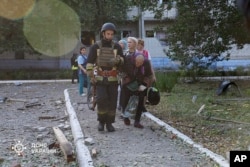Russian forces hit a care center for the elderly in the Ukrainian city of Sumy on Thursday and targeted its energy sector in airstrikes that killed at least one civilian, Ukrainian officials said.
In the daytime attack on Sumy, a Russian guided bomb struck a five-story building, officials said. At least one person was killed, and at least 12 others were injured, the Ukrainian interior ministry said in a statement. Photos from the scene showed elderly patients being evacuated from the building.
Ukrainian President Volodymyr Zelenskyy said rescue teams were searching to see whether people were stuck beneath the rubble.
A United Nations monitoring body said the attack on the power grid probably violated humanitarian law.
The power grid attack came on the same day that the European Union announced it would provide Ukraine with about $180 million in energy funding – about $111 million of it coming from frozen Russian assets – ahead of what promises to be a tough winter after Russia’s assault on the Ukrainian energy grid.
Russia has throttled the Sumy region’s energy system in several attacks this week, reducing power in some areas. The International Energy Agency warned on Thursday that Ukraine’s electricity supply risked “severe disruptions” this winter.
“Ukraine’s energy system has made it through the past two winters thanks to the resilience, courage and ingenuity of its people and strong solidarity from its international partners,” IEA Executive Director Fatih Birol said in a statement Thursday. “But this winter will be, by far, its sternest test yet.”
At a Brussels news conference, European Commission President Ursula von der Leyen said about $67 million of the funding would go toward shelters, heaters and other humanitarian aid, while the balance, funded by the Russian assets, would be used for repairs to the grid and investments in renewable energy.
Regarding the use of the Russian assets, von der Leyen said, “It is only right that Russia pays for the destruction it caused.” She said the EU would continue transferring proceeds from the assets to fund Ukraine’s “energy resilience,” which includes decentralizing energy production and adoption of renewables such as solar.
Von der Leyen said she would be traveling to Kyiv on Friday to discuss the energy situation plans.
The EU energy assistance follows a report from the IEA that said because of an increase in the intensity of Russian attacks on the nation’s energy infrastructure, Ukraine was facing perhaps the most difficult winter, from an energy standpoint, since Russia’s invasion in 2022.
Speaking at the same news conference, IEA’s Birol said a Russian attack late last month damaged a large portion of Ukraine’s infrastructure.
Even before that, Birol said, “because of the previous attacks on the Ukrainian energy infrastructure, two-thirds of the power generation capacity of Ukraine was lost.”
Birol said winter energy demands could be a major issue for electricity and heating, not only for Ukraine homes. The IEA sees “huge implications” for hospitals, schools and communication networks. He said this might lead to some consequences “beyond the energy sector.”
In Washington, U.S. congressional leaders and President Joe Biden’s administration are getting closer to an agreement to seek a one-year extension of $6 billion in military aid for Ukraine, Reuters reported Thursday. The aid is due to expire this month.
Biden and Vice President Kamala Harris will meet separately with Zelenskyy on September 26, the White House said in a Thursday statement.
On the battlefield, Ukraine said Thursday that its air defenses shot down all 42 drones that Russia used in overnight attacks targeting regions across the country.
Ukraine’s air force said it also shot down a Russian guided missile. Russia’s attacks included drones directed at the Cherkasy, Dnipropetrovsk, Kherson, Kirovohrad, Kyiv, Mykolaiv, Rivne, Vinnytsia and Zhytomyr regions, the military said.
On Thursday, Russian President Vladimir Putin said Russia was increasing drone production by about 10 times to nearly 1.4 million drones this year as part of Moscow’s war effort in Ukraine.
Russia’s Defense Ministry said it destroyed two Ukrainian drones over the Kursk region and another drone over the Belgorod region.
The exchange of aerial attacks came a day after a Ukrainian drone hit a warehouse in Russia’s Tver region, sparking a large fire and forcing evacuations in the area.
“The enemy hit an ammunition depot in the area of Toropets,” said Yuri Podolyaka, a Ukrainian-born, pro-Russian military blogger, Reuters reported. “Everything that can burn is already burning there [and exploding].”
Igor Rudenya, governor of the Tver region, said on Telegram that the drones had been shot down and a fire was burning, but the situation was “under control.”
In his nightly address, Zelenskyy did not mention the blast specifically, but he said a “very important result was achieved” on Russian territory that weakened the enemy. He also said Ukrainian forces had decreased the potential of Russian forces to launch attacks in the eastern front’s Donetsk region.
Ukraine’s state security service earlier said the warehouse held missiles, guided bombs and artillery ammunition. Previously, Russian media had called the site a major conventional arms arsenal.
Some information for this report came from The Associated Press, Agence France-Presse and Reuters.




